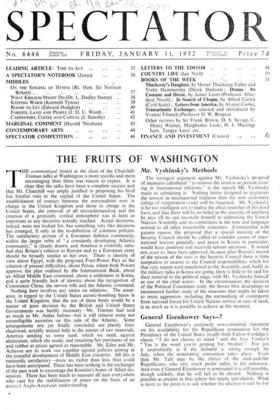THE FRUITS OF WASHINGTON T HE communiqué issued at the close
of the Churchill- Truman talks at Washington is more specific and more encouraging than there was reason to expect. It is clear that the talks have been a complete success and that Mr. Churchill was amply justified in proposing his brief • but fruitful visit to the capital of the United States. The establishment of contact between the personalities now in charge in the United Kingdom and those in charge in the United States, the removal of all misunderstanding and the creation of a genuinely cordial atmosphere was at least as important as any decisions actually reached. Actual decisions, indeed, were not looked for, but something very like decisions has emerged, if only in the re-definition of common policies. The satisfactory picture of a European defence community, within the larger orbit of "a constantly developing Atlantic community," is clearly drawn, and America is evidently satis- fied that Britain's relation to Europe and to a European army should be broadly similar to her own. There is identity of view about Egypt, with the proposed Four-Power Pact as the solution of present difficulties, about Persia, where both Powers approve the plan outlined by the International Bank, about an Allied Middle East command, about a settlement in Korea, and a quite friendly lack of identity about the recognition of Communist China, the service rifle and the Atlantic command.
Nothing here involves any strain on relations. The assur- ance, in regard to the United States atomic-bombing bases in the United Kingdom, that the use of these bases would be a _ matter of joint decision by the British and United States Governments -was hardly • necessary—Mr. Truman had said • as much to Mr. Attlee before—but it will remove some not unintelligible anxieties on this side of the Atlantic. Some arrangements not yet finally concluded are plainly fore- shadowed, notably mutual _help in the matter of raw materials. . America sending us some steel; which we need, against aluminium, which she needs, and resuming her .purchases of tin and rubber at prices agreed as reasonable. Mr. Eden and Mr. • Acheson are to work out together agreed policies aiming at the peaceful development of Middle East countries. All this is eminently satisfactory—more so, rather than less, than could have been anticipated. There has been nothing in the exchanges of the past week to encourage the Kremlin's hopes of Allied dis- sension. There has been much to reassure all men everywhere who care for the stabilisation of peace on the basis of an assured Anglo-American understanding.


































